زیادہ تلاش کیے گئے الفاظ
محفوظ شدہ الفاظ
کِھسیانی بِلّی کَھمبا نوچے
جسے غصہ آرہا ہو وہ دوسروں پر اپنی جھلاہٹ اتارتا ہے، بے بسی میں آدمی دوسروں پر غصہ اتارتا ہے، شرمندہ شخص دوسروں پر اپنی شرمندگی اتارتا ہے، کمزور کی جھنجھلاہٹ
چَمَنِسْتان
ایسا باغ جہاں پھول کثرت سے ہوں، ایسی جگہ جہاں دور تک پھول ہی پھول اور سبزہ سبزہ نظر آئے، گلزار، گلستان، باغ، پھولوں کا قطعہ، سبز کھیت
Beyond the Spectacle: The Many Faces of Tamaasha

In Urdu, the word tamaasha (تماشہ) has a sparkle—it can mean a show, a spectacle, or even a scene that draws eyes and laughter.
But beneath its playful surface, it holds layers of meaning—from delight to distraction, from curiosity to commentary.
The Many Shades of Tamaasha
At its simplest, tamaasha means an exhibition, spectacle, or entertainment. It could be a funfair, a film, or even a quarrel on the street that gathers a crowd.
In Marathi, Tamaasha is a traditional folk theatre and dance form.
In Tamil, it carries the sense of fun and playful banter.
But its journey begins in Arabic, where tamaasha.ii meant “walking together on foot.”
The Persians adopted it as tamasha, giving it the sense of diversion or recreation. Over time, it came to mean something worth watching — a sight that stirs wonder or amusement.
And sometimes, one’s own life becomes a tamaasha— a scene others observe, half in sympathy, half in amusement.
Speaking of amusement, there is a proverb:
بوڑھے منہ مہاسے، لوگ چلے تماشے
buu.Dhe mu.nh muhaase, log cha.chale tamaashe
This proverb implies that getting pimples in old age is something rather ridiculous — since pimples are seen as a sign of youth.
Tamaash-biin (تماش بین) — The Watcher
The Persian suffix-biin (بین) means “seeing” or “beholding.”
Thus, tamaash-biin is one who watches the show — a spectator, onlooker, or bystander.
It reminds us of duur-biin (دوربین) — telescope — another word ending in biin, symbolizing seeing from afar.
The word tamaasha.ii (تماشائی) is also used for a watcher or onlooker
How beautifully Fanaa Nizami kanpuri has used this word in this couplet:
ساحل کے تماشائی ہر ڈوبنے والے پر
افسوس تو کرتے ہیں امداد نہیں کرتے
saahil ke tamaasha.ii har Duubne vaale par
afsos to karte hai.n imdaad nahi.n karte
The spectators on the shore pity the drowning,
But never reach out to help.
Naaziriin, saame'iin, qaari.iin, haaziriin
The world of tamaasha opens into many others — each linked by the act of perceiving:
Naaziriin (ناظرین) — those who see (from nazar, sight)
مداری جانتا تھا آخری تماشا ہے
سو کھیل ایسا کیا ناظرین رونے لگے
madaarii jaantaa thaa aaKHirii tamaashaa hai
so khel aisaa kiyaa naaziriin rone lage
The juggler knew it was his last show,
He played so well that the audience wept.
Saame'iin (سامعین) — listeners, from sam’ (hearing).
Radio programs have saame'iin, not viewers.
Qaari.iin (قارئین) — readers, from qaari (قاری), one who reads or recites — especially a reciter of the Qur’an, careful with huruuf (letters) and maKHaarij (pronunciations).
Haaziriin (حاضرین) — those who are present, from haazir (present).Every gathering has its haaziriin, and every performance its shaa.iqiin (شائقین) — enthusiasts or admirers, from shauq (شوق), meaning interest or passion.
Conclusion
Every scene in life is a kind of tamaasha —sometimes we are the watchers, and sometimes we become the scene itself.
A tamaasha is not only laughter or surprise — it gathers within it the colors of life, the stories of our bonds, and the quiet turns of time.
All it needs is an eye that can see — and find meaning in every spectacle.
Delete 44 saved words?
کیا آپ واقعی ان اندراجات کو حذف کر رہے ہیں؟ انہیں واپس لانا ناممکن ہوگا۔






